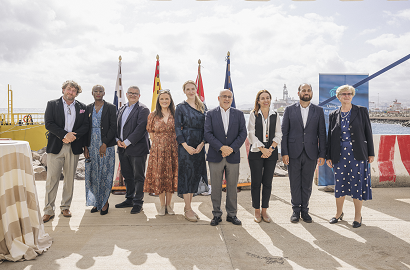Norwegian company Ocean Oasis presents prototype for desalination using wave power in Canary Islands

The project was part of the ICEX Invest in Spain Programme for Investment by Foreign Companies in R&D activities, financed by European Union ERDF funds
The Norwegian company Ocean Oasis has just presented a prototype of the “Gaia” floating desalination plant, which is powered by wave energy and will undergo testing at the Oceanic Platform of the Canary Islands (PLOCAN). The project was part of the ICEX Invest in Spain Programme for Investment by Foreign Companies in R&D activities, financed by European Union ERDF funds. This technology will enable the production of fresh water from ocean waters by harnessing wave energy to power the desalination process and supply water to coastal areas.
A second model will be developed once this stage has been completed by testing the desalination plant on the PLOCAN test bed. In this phase, the prototype will be scaled up with the capacity to produce drinking water and connected to the water distribution system, thus reducing the pressure on natural freshwater resources in a sustainable way.
The presentation ceremony for the “Gaia” prototype took place at the Juan Sebastián Elcano dock at Puerto de la Luz (Port of Las Palmas), and was attended by the Director General of Energy for the Canary Islands Government, Rosana Melián, the President of the Cabildo de Gran Canaria, Antonio Morales, and the Director of PLOCAN, José Joaquín Hernández Brito, as well as the teams at Ocean Oasis and at Norwegian company Grieg Edge, representing the investors.
Ocean Oasis CEO Kristine B. Fredriksen thanked Innovation Norway, the Norwegian Research Council, the European Innovation Council EIC Accelerator and, in particular, the Economic Promotion Society of Gran Canaria and ICEX, through its Invest in Spain programme, for their financial support in the development of the prototype, which was co-financed with ERDF funds. In her speech, she also said that Ocean Oasis has set up an office and R&D workshop in Las Palmas de Gran Canaria, announcing that the company will continue to carry out activities on the islands, while celebrating having “our prototype floating in the harbour”.
The company's Operations Director, Sebastián Feimblatt, highlighted the fact that the Canary Islands “provide us with the ideal environment in which to test our technology, because of PLOCAN's infrastructure, experience and location, and also because of the possibility of developing a solution in a market as important as the Canary Islands in terms of desalination and offshore activities”.
The CTO of Ocean Oasis, Thomas B. Johannessen, explained that the prototype, assembled in the port of Las Palmas, is seven metres in diameter, ten metres high and weighs around 100 tonnes. The device extracts wave energy through the relative motion of two bodies harnessing this energy directly to carry out a reverse osmosis desalination process without the need to produce electrical energy, thus increasing the efficiency of the process. Gaia will be anchored in the southern part of the PLOCAN test bed off Punta de la Mareta.
For her part, the Director General for Energy, Rosana Melián, highlighted the progress made by the islands in becoming a testing platform for new technologies aimed at creating clean energies, and being the focus for large companies wishing to explore these techniques in greater depth in order to continue on the path towards energy transition.
The event was also attended by the President of the Cabildo de Gran Canaria, Antonio Morales, who said that Gran Canaria depends on desalinated water for its survival, and that “this is becoming more important every day as a result of the drought. But desalination is a very energy-intensive process. If we take into account all the processes required to obtain water, these represent between 15% and 20% of the total energy consumption on our island. We welcome such innovative initiatives, as they may make a significant contribution to guaranteeing water supply and accelerating the energy transition.”
Finally, the Director of PLOCAN, José Joaquín Hernández Brito, congratulated Ocean Oasis on the prototype, and expressed the need to “make progress in terms of regulation to speed up the processing of permits for technological developments”.
Desalination growth and offshore potential
Over 300 million people currently rely on desalination for their water supply, accounting for around 1% of the overall freshwater supply. Climate change and the depletion of traditional resources is increasing the need for desalination, and it is estimated that this will need to double by 2030 to meet the population’s needs.
However, traditional desalination consumes huge amounts of energy and is very expensive, as well as having a large carbon footprint. This is why Ocean Oasis indicates that desalination using wave energy adds a new dimension, and presents additional opportunities for providing desalinated water without generating harmful emissions, and without occupying land.
The use of wave energy in deep water also allows for sustainable clean water harvesting and brine disposal, minimising environmental impact.
Ocean Oasis markets
Ocean Oasis technology can be used on coasts around the world where wave action is sufficient, including the Canary Islands, South Africa, Morocco, Chile and Australia.
There is potential for its use in the Canary Islands, and this is a great opportunity for supplying the islands with desalinated water and reducing both environmental impact and cost. This is why the company hopes to build and install its first commercial models in the Canary Islands.
The technology could be used much more extensively, but to do this, the Director of PLOCAN considers it necessary to “make progress in terms of regulation to speed up the processing of permits for technological developments, as current circumstances make it very difficult to exploit the great potential of renewable energy in the Canary Islands and in Spain, where the capacity exists to achieve self-sufficiency. If we want to meet energy transition targets, we have to hurry up with the paperwork”, he said.
Photo: Ocean Oasis




